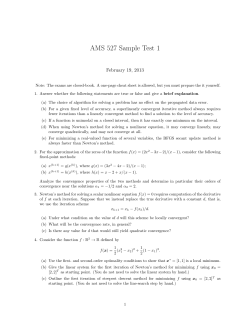
Advanced Data Morphing
ADVANCED DATA MORPHING
Advanced Data Morphing
Project parameters
Parameters can be used instead of file names in
transformations and as constants in expressions:
[Amount] * {Exchange rate}
Parameters are global for all tables
Parameter types:
•
•
•
•
Parameter
Number or text
File name – text with file browser button
Date – number with date picker
Calculated parameter – parameter that is calculated using
an expression
Parameter Editor
Type: File Name
Type: Date
Calculated
parameter
Choose
parameter type
Parameters in expression editor
List of parameters lives here
Project parameters (continued)
Calculated parameters can’t refer to other calculated
parameters in order to avoid cyclic dependencies
Non-calculated parameters are prompted on full runs:
• On Run after a project is opened
• On Reload and Run
Parameters can be defined when running a project in
command line mode. Examples:
morph.exe /c /run /param:Year=2015 proj.morph
morph.exe /c /run /param:”File name”=“C:\My
documents\file.csv” proj.morph
Iterations
Iterations in EM are done by running another EM
project and passing to it all values of a column
through a parameter, one row per iteration:
iteration #1
Project B
Run with
Param1 = aaa.txt
iteration #2
Project B
Run with
Param1 = bbb.txt
iteration #3
Project B
Run with
Param1 = ccc.txt
Project A
Table 1
File Name
aaa.txt
bbb.txt
ccc.txt
Project A runs Project B 3 times, assigning its Param1 with values from [File Name]
Iterate transformation
Used for iterations in EasyMorph
Two iteration modes:
• Iterate – run another project N times, return nothing (the
other EM project is supposed to have at least one export
transformation)
• Iterate and Append – run another project N times, return N
final states of the specified table in that project, and
append all of them into one table which becomes the
output of Iterate transformation
The project to run can be specified by a parameter
Iterations (2)
Iterations are very versatile:
•
•
•
•
Processing a list of files, or a sequence of dates
Cycles (Param = 1, 2, … N)
Nested iterations (A runs B that runs C)
Reusable logic (A runs C, B runs C)
General design pattern: prepare a list, then iterate
Pass more than one parameter if needed:
{ParamA} = [File Name]
{ParamB} = [Year]
Not assigned parameters have default values
Transformations for list creation
Iteration lists can be loaded from external files or
created using various transformations:
Calendar – generates a list of dates for specified time
period, including optional columns such as day of week,
weekend flag, etc.
File List – generates a list of files in a specified folder,
including optional columns such as file size or date
created
Folder List – generates a list of folders in a specified folder
Sequence – generates a table with one column with
numbers from 1 to N
Parsing complex spreadsheets
Identify boundaries of tables on a sheet
Table 1
Table 3
Table 2
Sheet1
Parsing complex spreadsheets (2)
Use Derive Table to branch calculations
Parsing complex spreadsheets (3)
Crop identified tables using Trim Table and Select
Columns transformations
Select Columns
Trim Table
Table 2
Parsing complex spreadsheets (4)
After cropping keep transforming further
Parsing complex spreadsheets (5)
Useful transformations for dealing with spreadsheets:
Trim Table and Trim Table By Condition – remove
unwanted rows below or above
Fill down – fill empty cells down with nearest nonempty value in the same column
Unpivot – turn matrix table into a straight table
Label Columns – make column names from one or
more top rows
Error propagation in expressions
If a part of an expression evaluates to an error then
entire expression returns the error
• Simpler debugging of complex expressions
Reference to an error in another column is also an
error
Some functions don’t have error propagation (e.g.
iserror, istext, etc.)
• See full list here
http://help.easymorph.com/doku.php?id=syntax:errorprop
agation
Conditions
Conditions – expressions that must return only either
TRUE or FALSE for any row
Any other value stops project execution with an error
Used in transformations:
• Filter by condition
• Trim table by condition
To deal with errors in column values, remove errors
first (e.g. using iserror ) and only then apply
conditions
easymorph.com
© Copyright 2025
















